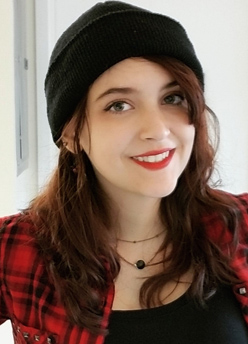
Hometown: Pottstown, Pennsylvania
Undergraduate: Ursinus College, BS in Neuroscience
Current program: Molecular & Cell Biology & Genetics PhD, 2017 - present
Can you tell me a little bit about yourself before you came to Drexel?
I've always been driven by learning and exploring a large variety of interests, from science to history, psychology to paleontology, art to zoology. I still am! But the biology of disease had been particularly fascinating to me, even from a very early age. Having so many interests meant I also had no idea what I wanted to pursue as a career! My liberal arts college encouraged me to explore different fields of interest rather than settling on just one. I loved being able to spend one class learning to read scientific manuscripts and then an hour later learning how to read ancient poetry. But it was in my neuroscience and microbiology courses that I found myself enjoying just listening to the lecture. Suddenly I wanted to learn everything I could about the brain and about infectious diseases. I started doing extra research, wanting to get as much experience as possible. I never believed I was someone who could be a scientist, until I was encouraged by my undergraduate professors and research advisor.
How did you discover your program?
I entered the DUCoM PhD program directly after earning my BS from Ursinus College. Drexel's Molecular & Cell Biology & Genetics PhD program was perfect for me, as it allowed me to explore a larger range of interdisciplinary biomedical research topics, leading me to my current neurovirology lab.
What has your relationship with the faculty been like?
I have a great relationship with the faculty in my program, especially my research mentor (Dr. Mike Nonnemacher). Graduate school can be incredibly difficult, and feeling supported by your mentor(s) can make all the difference.
How about the relationship with your classmates?
I had a very good relationship with the cohort I entered the program with. We have since all gone into different research labs, but it's always nice when we see each other. I also have good relationships with my lab members; everyone is very kind and supportive.
Can you tell me about the research that you are doing?
I work in a neurovirology lab, where I research how astrocytes (a type of cell in the brain) and the blood-brain barrier respond to chronic HIV infection, and how this may contribute to the development of HIV-associated neurocognitive disorders.
Are you involved with any extracurricular activities? How do these support your academic journey?
I have served on the Biomedical Graduate Students Association since 2018 (current vice president), and have also participated in community outreach with Biomecial Graduate Students. I began tutoring in 2019 and that is how I found my passion for teaching. I am currently the CLASS content chair for DUCoM. I do wish there were more opportunities in my graduate program for other kinds of extracurricular activities, like singing, music or theater.
What are your long-term goals?
I want to go on to be a professor, either at a liberal arts college, a graduate school or a medical school. I am very passionate about teaching biomedical science. I'd also like to continue doing research with neuroinfectious diseases.
What advice would you give to a future student?
1. Whatever it is you decide to pursue, make sure it is something that you genuinely find fascinating and exciting. Of course you won't feel that way 100% of the time, but the topic should be something that, at the end of the day, you're proud to be focusing on.
2. Always select mentors that you feel comfortable with, that demonstrate respect for you as a human being, who have a management style that works for you, and that want to support you in your goals. Never "settle" for research mentors.
3. Your journey is your own. So don't compare yourself or your progress to the people around you.